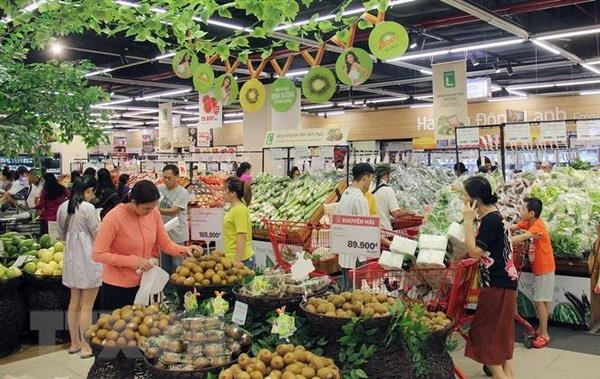The fluctuating price of pork last year had significant impacts on the market, as the price plummeted in the first half of the year then soared in the second half.

Managing prices and inflation would be more complex and difficult this year, experts have said.
The fluctuating price of pork last year had significant impacts on the market, as the price plummeted in the first half of the year then soared in the second half.
The pork price dropped from VND46,000 (US$2) - VND50,000 per kilogramme to a record low of VND28,000 - VND32,000 per kilogramme in the first six months of last year.
After that, the price increased gradually from July and soared from October with an increase of about 60 – 80 per cent compared to September and 60 – 95 per cent compared to the beginning of last year.
Prices of pork products are currently very high with the live pig price ranging between VND80,000 - 90,000 per kilogramme and pork at VND160,000 - 180,000 per kilogramme.
After the shock of the pork price increasing by more than 50 per cent in the fourth quarter of last year, curbing inflation below 4 per cent this year was no longer certain when the consumer price index (CPI) of last December increased by 5.23 per cent year-on-year, the highest level in the last nine years, Nguyen Duc Do, deputy director of the Institute of Economics - Finance, told Kinh te & Do thi (Economic and Urban Affairs).
The expert said if pork prices fell sharply around Tet (Lunar New Year), average inflation might be only at 3 per cent this year.
However, if pork prices remained at their current high levels in the first quarter, average inflation could be about 3.5 per cent.
In a worst-case scenario where African swine fever doesn't end in the first half of this year and inflation over the same period last year only starts to decline from the middle of this year, keeping inflation below 4 per cent would be relatively difficult, he said.
Assuming other factors affecting inflation such as oil prices, exchange rates, medical services and education did not change significantly, Do predicted that inflation would increase by 3.5 per cent on average this year.
As the price of some commodities such as petrol might rise due to world economic and political instability, experts said inflation would be complicated and unpredictable.
A representative from the Ministry of Finance's Price Management Department stated that the price of some items might see an upward trend.
Specifically, gasoline prices might increase slightly. The price of pork, due to the impact of African swine fever, was still a complex matter. The domestic pork supply is declining, and breeding has not been effective, therefore, the price was expected to continue to increase in the first months of this year, the representative said.
At the same time, health service prices were expected to be affected by the adjustment of management cost and basic salary.
The price in education services also looks set to continue to increase this year.
Regarding electricity prices, although is no plan for an increase this year, the demand for electricity was still high for production and consumption, which would increase CPI.
In addition, the prices of food, beverages and garments might increase at the beginning and end of the year due to shopping needs during the holidays.
To achieve the National Assembly's goal of keeping inflation under 4 per cent this year, the department said price management and inflation control this year must be implemented prudently, flexibly and proactively.
The Ministry of Finance would continue to work with relevant agencies to control market prices, especially during Tet and the first months of the year. — VNS





